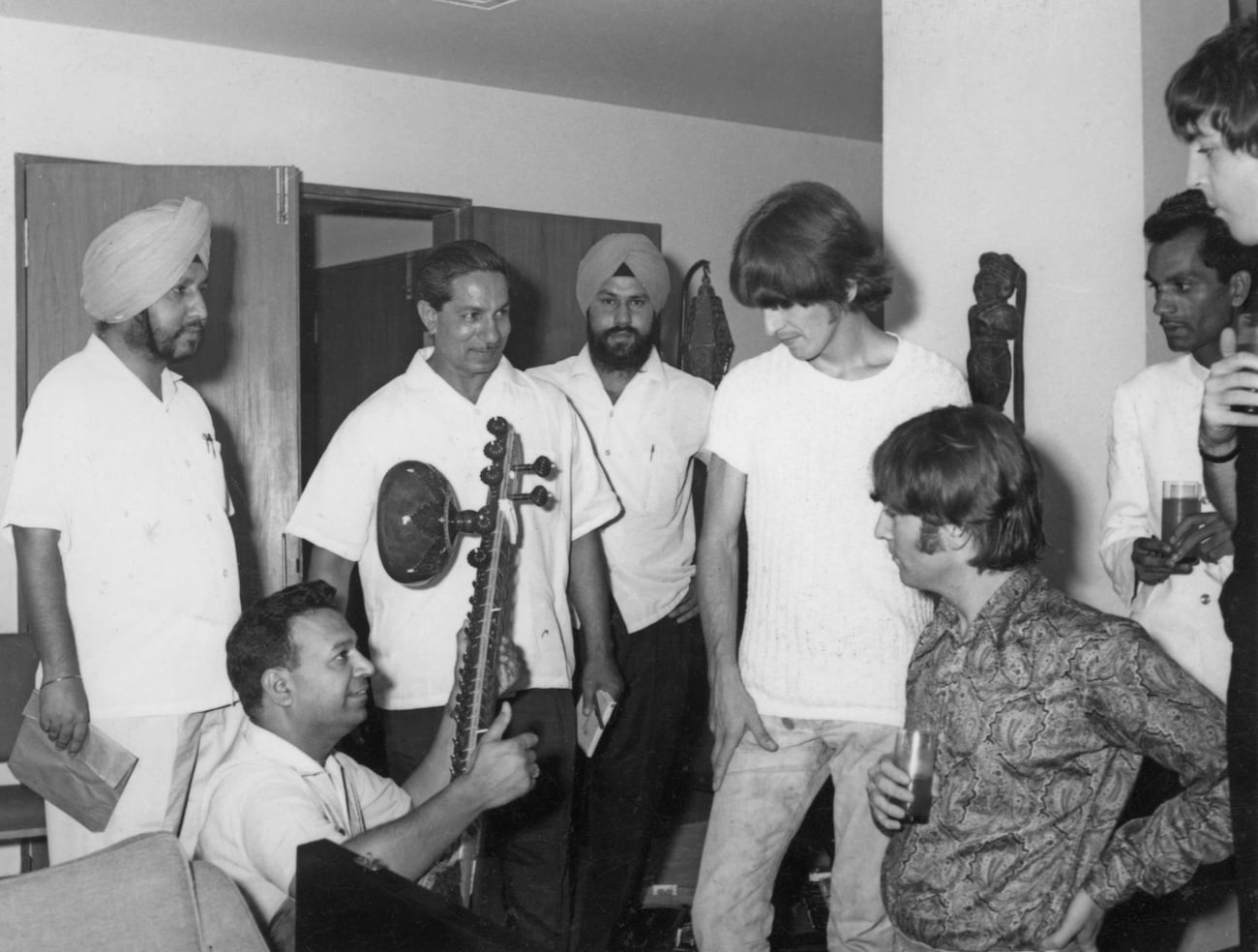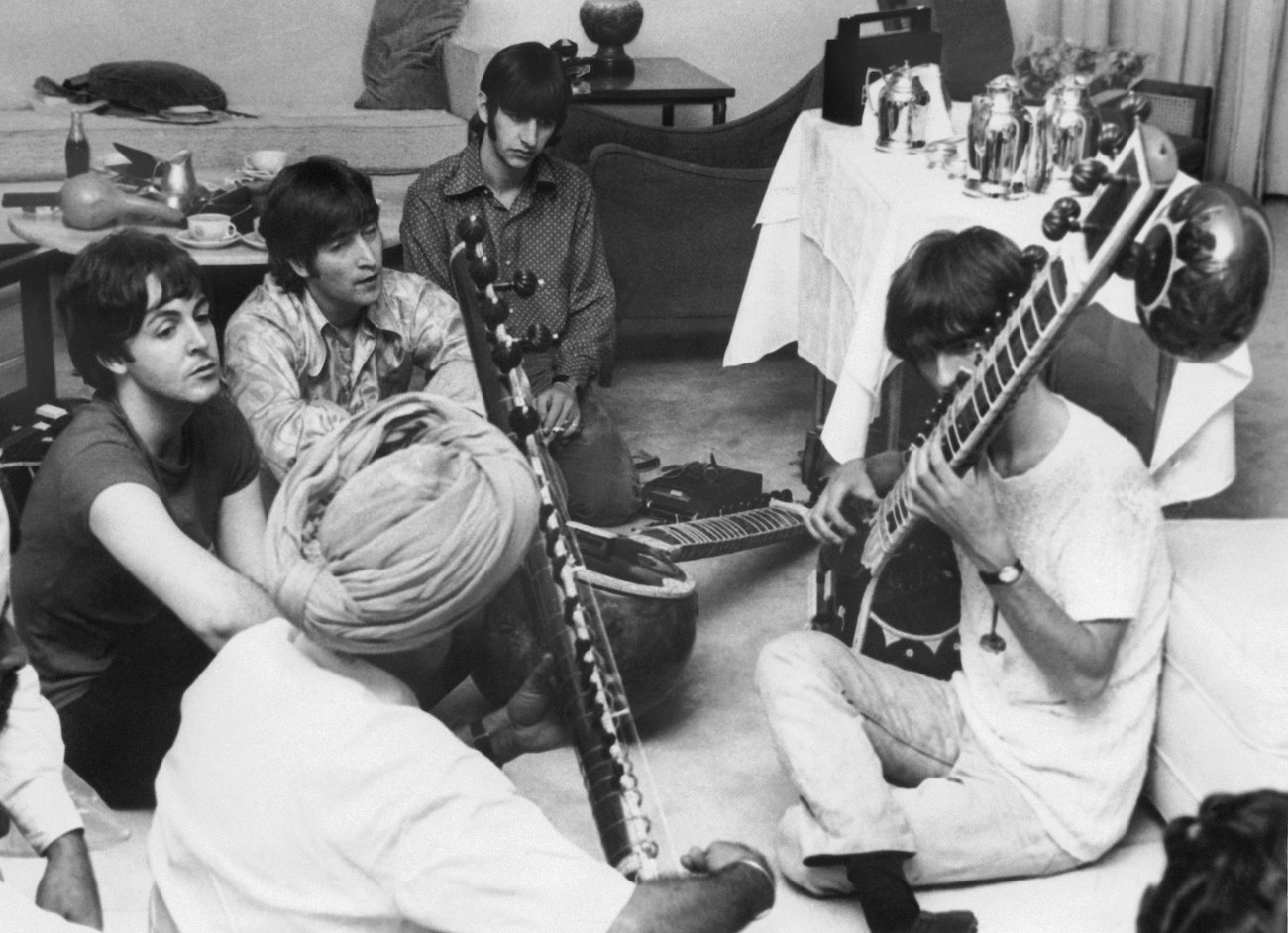
George Harrison Once Said Indian Music Shouldn’t Be in Rock Music Again Because No One in the West Liked It
George Harrison fell in love with Indian music on the set of The Beatles’ Help! The sounds intrigued him so much that he started incorporating them into Beatles songs. Suddenly, George introduced the West to Eastern music. It led him to Ravi Shankar, his musical guru, and spirituality.
However, despite how the sounds changed his playing and connected him with God, George once admitted that Indian music had no place in rock ‘n’ roll.

George Harrison became entranced by Indian music in the mid-1960s
Technically, George first heard Indian music in utero. His mother used to play the radio station, Radio India, hoping the mystical sounds of Eastern music would calm her rambunctious unborn baby.
Later, George became enraptured, hearing Indian music playing during the Indian restaurant scene in The Beatles’ Help! in 1965. He couldn’t stop hearing the sitar’s interesting sound and went and bought one. Then, his friends told him to listen to Shankar’s music. Listening to the sitarist’s ragas for the first time changed George’s life.
In Here Comes The Sun: The Spiritual And Musical Journey Of George Harrison, Joshua M. Greene wrote, “Describing the moment years later, George said the music felt familiar, not intellectually but emotionally, as though calling him back to a place he already knew.”
George added the sitar to The Beatles’ “Norwegian Wood.” Then he finally met Shankar in 1965. George impressed the sitarist so much that he offered to teach George sitar. The Beatle felt he could’ve left everything behind to learn more from his guru.
“Ravi embodied something new for the young musician, something that went far beyond fame and wealth,” Greene wrote. “Ravi was inviting George to examine life through a lens that revealed something extraordinary: that the talent behind his unprecedented success had a higher purpose.
“God is all around us but hidden. If George made the right sound, he could bring God out of hiding.”
Suddenly, Indian music started influencing “the inflection” of how George played guitar. “Whatever you listen to has to come out in some ways or other,” George told Guitar World in 1992. “I think Indian music influenced the inflection of how I played, and certain things I play certainly have a feel similar to the Indian style.”
George’s playing wasn’t the only thing that changed, so was his songwriting. He was bringing Indian music to the West.
George said Indian music shouldn’t ever be in rock music again
Despite how much George loved Indian music, he eventually realized it had no place in Western pop music or rock ‘n’ roll. He’d pioneered the Indian rock sound, but fans in the West didn’t dig it.
For instance, fans weren’t pleased that George added long Indian music sets during his 1974 American tour. They didn’t buy his Indian-influenced songs as much as his rock ones either.
In 1976, India Today asked George if Indian music had “a more permanent role to play in rock music.”
George replied, “No! I haven’t done a single Indian track since ‘Sgt. Pepper,’ and I suppose ‘Inner Light,’ which incidentally, was recorded in Bombay with Paul singing harmony – Ringo and John weren’t around! On my last U.S. tour I took Ravi and Ali Akbar along but audiences don’t seem interested!
“You can, I guess, use Indian instruments in music but then you use such beautiful instruments in your own ‘nonsense music’ – the film songs – so why not in the West? Personally, I think Indian music is where it’s at. If I had to choose one record in the whole world, I’d select Bismillah Khan, and that’s it.”
The Beatle said he preferred Indian music to any other form of music
George admitted that he listened to Indian music more than any other form, even though he knew it didn’t fit in in the West.
According to Greene, music journalist, Ray Coleman asked George about his love of Indian music. “I don’t fancy myself as the next Ravi Shankar,” George said, “but I still prefer Indian music to any other form of music. It has taken over 100 percent in my musical life. . . . Just learning the sitar has inspired me.”
Greene wrote, “He wanted to say more, to substantiate for the writer something that still eluded him, and he groped for the words. ‘You know how God is a, sort of, untouchable thing?’ George asked. ‘Well, that’s how it is with Indian music. It’s a very spiritual thing, so subtle and related to philosophy and life. It’s not easy to understand the music at first, but it’s beautiful when you get it.”
Without Indian music, George wouldn’t have had his distinct slide guitar sound. Nor would he have been able to connect to God through notes as beautifully.


